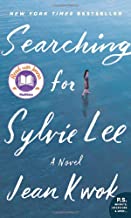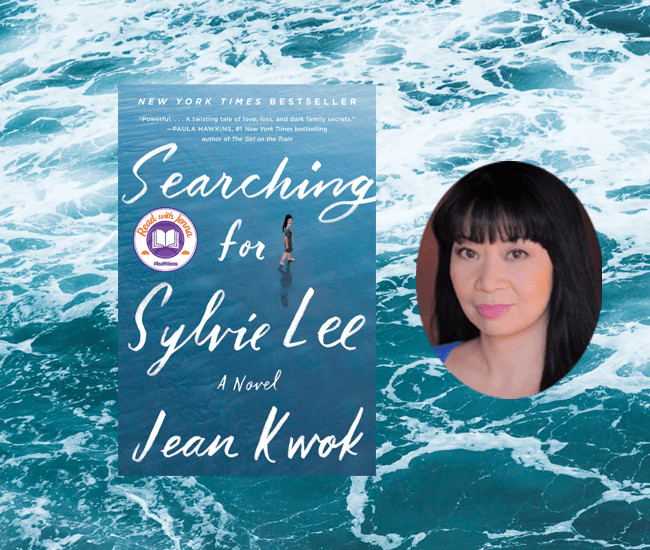Searching for Sylvie Lee by Jean Kwok
Searching for Sylvie Lee (William Morrow) is the perfect combination of literary fiction and suspense. Jean Kwok lets us inside the minds of Chinese immigrant sisters Sylvie, Amy and their Ma. Smart, pretty and accomplished Sylvie is the golden child in the family. Having grown up with her grandmother in the Netherlands, she felt compelled to return there when Grandma became ill. Younger sister Amy is shy and insecure. When Amy hears that Sylvie has mysteriously disappeared, she has to pull it together to be strong, and travel overseas to find out what happened to her beloved big sister.
Ma’s relationships with her daughters are complicated; she immigrated to NYC when she and Pa were young and she was pregnant. They were very poor and worked many jobs to stay afloat. Once Sylvie was born they sent her to the Netherlands to be cared for by Ma’s mother, as they thought it would be a better life for her. The feeling of rejection had a huge impact on Sylvie and her other relationships. She stayed in Amsterdam for more than 8 years, and when Ma and Pa had another daughter, Sylvie returned to NY, yet she felt she was called home to be a babysitter for her younger sister, Amy.
Communication barriers and lack of understanding add to the tension of this story and is often the case with immigrant families. The relationship with children can be strained and sacrificed when coming to a new country as the parents have a hard time learning the ways of the new home yet the kids haven’t lived any other way.
Ma’s communication skills are limited because she only speaks broken English, but her thoughts in Chinese are clear and strong. Sylvie spent her formative years in Dutch culture, feeling loved by her Grandma and cousin and on unsettled ground with her aunt and uncle, and Amy was from NY, had hard-working, supportive parents but struggled with a stutter and had a hard time expressing herself.
Searching For Sylvie Lee is a story of love …the beauty and the pitfalls, the joy and the heartbreak. An unexpected disappearance becomes a full-on mystery, and pain, confusion and misunderstandings are the results of buried family secrets – unintentional hurt is inflicted all around, but does the truth come out too late?
A Chinese immigrant experience in NY and Amsterdam, Searching For Sylvie Lee is full of suspense and wonderful writing. This is one of my favorite books of the year!
The idea to write about a missing person was inspired by author Jean Kwok’s brother. Learn more about the devastating disappearance of Jean Kwok’s brother HERE.
Book Nation by Jen‘s Q & A with Jean Kwok
Q: What inspires you to write and how do you decide the format and genre?
A: I always write about issues that mean a great deal to me personally. Searching for Sylvie Lee was inspired by the real-life disappearance of my beloved and brilliant brother. I changed the main character to a woman, Sylvie, to escape the gravitational force of the true story, and Sylvie, her younger sister Amy and Ma indeed took on their own lives. However, since I did want to write about a disappearance and the ways in which we are hidden from each other by language and culture, it was natural to shape this book as a mystery surrounding a suspenseful immigrant family drama.
Q: The backdrop for Searching For Sylvie Lee is an immigration story about a family. How similar is your personal story?
A: Like Sylvie, I’m a first generation Chinese American immigrant and my family was also very poor when we first came to this country. Although I wasn’t sent away to be raised by my grandmother the way Sylvie was, I saw firsthand what it was like for every able-bodied person in my family to work day and night just to make ends meet. Even though I did end up going to Harvard and Columbia, I was never considered the golden child in my family – that role was reserved for my brother, the one who disappeared. I was too bad at being a Chinese girl: terrible housekeeper and cook, too opinionated and independent. So when he vanished, I had the same feeling that Amy did, of needing to pull myself together to try to figure out what had happened to my beloved sibling.
Q: The Grandmother took responsibility for Sylvie as a baby and, in the end, Sylvie felt it was important to be with her when she was ill. Typical family structure with traditional upbringing of the children by the parents was not the route this family took. How did you come up with this scenario? Can you tell us about your grandparents?
A: I actually never met any of my own grandparents because they were left behind in China when we emigrated. However, as the youngest of seven children, I often felt like my parents were in some ways my grandparents too, since they were the age of my friends’ grandparents. I also know many people who either needed to send their children back to their grandparents to be raised because they couldn’t afford to keep them or were sent back themselves as children. So the loving relationship between Sylvie and Grandma is something I understand deeply, even though I didn’t know my own grandparents. I watched my own parents grow older and more frail.
Q: I enjoyed all of the details that added to the richness of your story: the bike riding, the music lessons, the trip to Venice, the apple tart …where do you get your ideas?
A: Actually, all of the instances of flirtatious Dutch men on bicycles actually happened to me, which is not as fun as it sounds because my biking skills are even worse than Amy’s. When a huge Dutch guy swung himself onto the baggage rack of my little bicycle as I rode by, I lost control and we almost dove into a canal, which was terrifying because like Sylvie, I can’t swim! I like to use incidents from real life in my books and I also enjoy interviewing people and adding slices of their lives.
Q: I love that each of your main characters, Sylvie, Amy and Ma express their points of view in alternating chapters and yet the reader is the only one that sees the full picture. How did you decide to write it this way and what was your process? Did you have to make an outline or organize in any way before you started?
A: One of the questions that Searching for Sylvie Lee asks is, “How well do we truly know the people we love most?” In many immigrant families, the children adopt the dominant language of the country, English, while the parents still struggle with it, resulting in parents and children who no longer speak the same language fluently. I combined those two ideas by having the novel be told by three different narrators – Sylvie, Amy and Ma – all thinking in their own languages: Dutch, English and Chinese. Of course, the book’s written in English but since the inner dialogue is in each woman’s own mother tongue, we are able to get to know each of them in a way that the others can’t. So Ma thinking in Chinese is a much deeper, more complicated person than Amy, her own daughter, will ever know because Amy can only hear the Ma who speaks broken English.
I did outline the entire novel before I started writing. The release of information and clues is essential to the pacing of the book, so I had to figure out where to place the Facebook messages, newspaper articles, etc. to keep the reader turning the pages. Many details changed over the course of the novel but I was constantly backing up to check that the overall structure of the book was working well.
Q: Many of your characters have secrets and throughout the story you provide us with clues right up until we learn the truth. Did the clues appear naturally or did you add them in after you wrote the book?
A: I planned everything from the very beginning and I did know exactly how the book would end. I personally need to know the ending in advance because the progression of the entire novel is shaped by the ending. I always hope that my work will be both entertaining and enlightening, so I want the reader to enjoy the ride. I’m anticipating the reader experience throughout so that the ending is hopefully both surprising and yet earned.
Q: Sylvie is smart and pretty and looked upon as a being successful …Amy is insecure and lacks direction, but deep down, it seems these sisters are more alike than different. Can you give us some insight and tell us which one you relate to most?
A: I definitely relate to both of the sisters. I have the same perfectionist drive as Sylvie but am sadly not as talented, so I can identify with Amy who always felt like she was in Sylvie’s shadow as well. In my family, I was never considered smart or successful – that was my brother, and yet, my brother and I loved each other so much. He always took care of me and when we were very poor, he was the person who gave me a blank diary and said, “Whatever you write in this will belong to you.” That was the beginning of my life as a writer. So the love that binds the two sisters is very real to me as well.
Q: How long did it take to write this book and did you have to make any majors changes during the revision process?
A: It took about three years to write this novel and it really seemed to flow seamlessly. I sketched out the story and started writing. There were minor revisions along the way but it almost seemed to write itself. I have a wonderful editor who helped me enhance the relationships, and she also let me know when the foreign languages needed to be pruned back a bit, that sort of thing, but basically, the book has remained unchanged from its initial conception.
Q: This book is a beautiful combination of compelling fiction with well-developed characters, varied and descriptive background settings and an addictive mystery. Do you recommend any other books that have similar storytelling or other authors that have accomplished the same?
A: Thank you for your kind words. I think that Miracle Creek by Angie Kim is a wonderful novel that is similar in that it’s a page-turner wrapped around an immigrant family. This novel about a murder trial involving a Korean immigrant family after their medical facility explodes is a suspenseful, deep read.
Q: Can we expect another page-turner that takes us on a journey from you?
A: I’m working on a new novel right now and it’s about a young Chinese American immigrant woman who comes to the US to start a new life, but that fresh start is threatened when she gets involved with her white English teacher and he dies in a suspicious accident involving her. So indeed, I hope this will be another page turner that deals with deeper issues of immigration, culture, race and language.
Watch Jean Kwok’s interview on the Today Show HERE.
Buy this Book!
Amazon




